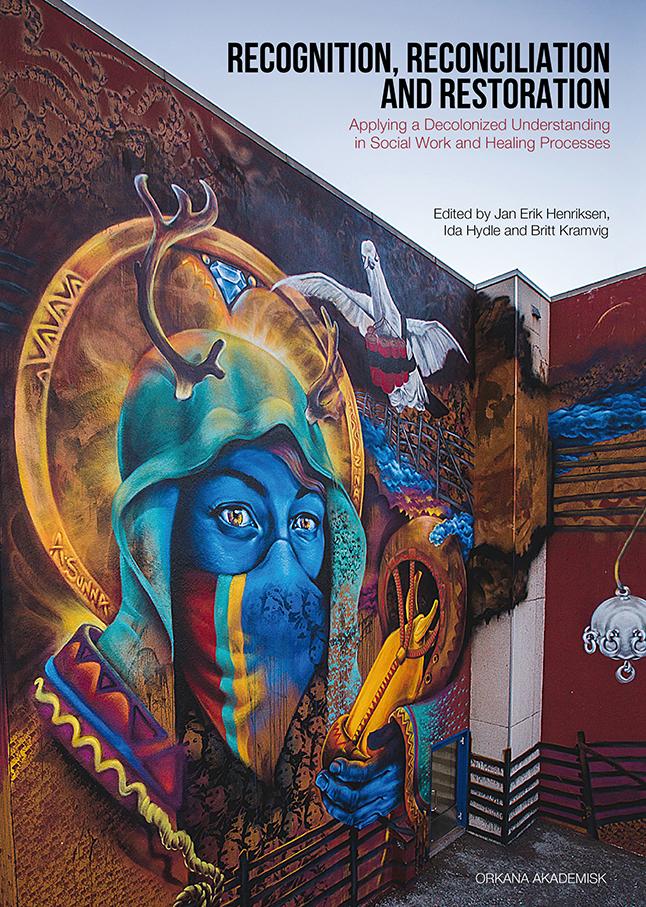IVO visited Vienna

The Indigenous Voices (IVO) research group - Álgoálbmogii jienat - Urfolks stemmer, was established in 2019. The group has its main affiliation with the Department of Child Welfare and Social Work (UiT) but has also members from the Department of Tourism & Northern Studies, Department of Education (UiT), as well as from the departments of ?? at the University of Helsinki. The research group consists of researchers with Sámi language, culture and social competence, and also knowledge about legal pluralism, human rights and Islam. All of the members are focused on postcolonization, decolonization and Indigenous Methodologies (IM). There is a need for more knowledge on how to heal, restore and decolonize a wast number of populations across the globe. Decolonizing means accepting peoples’ lived experience as a starting point when searching for solutions to social, health and cultural problems and issues they face, which, in many instances, are also relevant to non-Indigenous Peoples and global problems, such as climate change, pollution, war, poverty and hunger, refugees and internally displaced people, to name a few. This means putting people’s needs, uniqueness and knowledge first and seeing all the activities in which we engage from here on as honest attempts to discern the nature of decolonizing. Our group also studies the dynamics of social integration of minorities within minorities, such as refugees from the Middle East now settled in the north of Norway. We are focused on co-creation which means including users, local communities and other stakeholders who feel ownership or are engaged in our research tasks. Another main perspective for our work is using a two-eyed seeing perspective which means combining two different ontologies and epistemologies for example indigenous knowledge and modern science. Or practical knowledge combined with theoretical knowledge. The group will also focus on diversity and marginalization, in the effort to formalize UiT´s national responsibility for educating professionals to Sámi communities as well.he Indigenous Voices (IVO) research group - Álgoálbmogii jienat - Urfolks stemmer, was established in 2019. The group has its main affiliation to the Department of Child Welfare and Social Work, but has also members from the Department of Tourism & Northern Studies, Department of Education, as well from the University of Helsinki. The research group consists of researchers with Sámi language, culture and social competence. Indigenous Voices (IVO) goal is to contribute UiT to be in forefront of Sámi and comparative indigenous research on the social consequences of colonialization as well as decolonial and healing processes for recovery.
Colonialism as a political, social and cultural force has contributed to innumerable former and present conflicts, violent, armed, social and psychological – on people and land. UN and most countries claim that colonisation, apartheid and assimilation belong to the past. Discrimination and everyday racism (microhumilation), however, seem impossible to control and prevent. Neo-colonisation is still in progress in many countries, even if colonialism is considered to be part of the past. Suffering, poverty and exploitation are still societal and individual threats to all, not only to those who are directly involved. We need more knowledge on how to heal, restore and decolonize. Decolonizing means accepting Indigenous Peoples’ lived experience as a starting point when searching for solutions to the problems and issues they face, which, in many instances, are also relevant to non-Indigenous Peoples and global problems, such as climate change, pollution, war, poverty and hunger, to name a few. It means putting people’s needs, uniqueness and knowledge first and seeing all the activities in which we engage from here on in as honest attempts to discern the nature of decolonizing. The group will also focus on diversity and marginalization, in the effort to formalize UiT national responsibility for educating social workers to Sámi communities as well.
Goals for the period 2020 - 2023:
-Establish ourselves as a level 2 group.
-Establish a climate-friendly way of working.
-Arrange annual PhD courses.
-Conduct annual workshops with various research communities.
-Apply for smaller projects on an ongoing practical basis.
-Write a major international research application (NRC level, EU level).
-Strategic commitment to joint publishing.
-Strategic focus on international publishing.
-Initiate Indigenous peoples as a theme at professional conferences.
-Continuous participation in the public debate.
-Initiate / contribute to Sámi-related research and dissemination in connection to the Sámi National Day.
-Initiate /contribute to Indigenous-related research and dissemination in connection to the UN International Indigenous Peoples' Day.








2019
Henriksen, Jan Erik, Hydle, Ida and Kramvig, Britt (ed): Recognition, Reconciliation and Restoration: Applying a Decolonized Understanding in Social Work and Healing Prosesses. Orkana Akademisk, Stamsund
Henriksen, Jan Erik, Hydle, Ida and Kramvig, Britt; Applying a Decolonized Understanding in Healing Processes. In Henriksen, Jan Erik, Hydle, Ida and Kramvig, Britt (ed): Recognition, Reconciliation and Restoration: Applying a Decolonized Understanding in Social Work and Healing Prosesses. Orkana Akademisk, Stamsund
Kramvig, Britt and Verran, Helen; Stories, stones and memories in the land of dormant reciprocity. Opening up possibilities for reconciliation with a politics that works tensions of dissensus asnd consensus care. In Henriksen, Jan Erik, Hydle, Ida and Kramvig, Britt (ed): Recognition, Reconciliation and Restoration: Applying a Decolonized Understanding in Social Work and Healing Prosesses. Orkana Akademisk, Stamsund
Eikeland, Arnt Ove: Child poverty and persistent low income in Norway – with special attention on the Sámi indigenous minority. In Henriksen, Jan Erik, Hydle, Ida and Kramvig, Britt (ed): Recognition, Reconciliation and Restoration: Applying a Decolonized Understanding in Social Work and Healing Prosesses. Orkana Akademisk, Stamsundarea has been and is central in UiT´s strategic plans
Henriksen, Jan Erik and Hydle, Ida: Restoring Justice and autonomy in Sámi reindeer husbandry. In Henriksen, Jan Erik, Hydle, Ida and Kramvig, Britt (ed): Recognition, Reconciliation and Restoration: Applying a Decolonized Understanding in Social Work and Healing Prosesses. Orkana Akademisk, Stamsund
Wasiq Silan & Peter Mataira (2019). Insights into positionality and the voicing of indigeneity in research: Towards a critical theory of inbetweenness. Dutkansearvvi dieđalaš áigečála, 3(2), 108-124.
Flaten, Trond Peder; Hydle, Ida; Sverdrup, Sidsel Muri (2019). Ungdom, helse og velferd. Temanummer av tidsskriftet Norsk Epidemiologi, 2019, Vol. 28, No. 1-2. 116 s.
Halvorsen, Rolf Piene; Hansen, Aase Lyngvær; Hydle, Ida (2019). Performing visual empowerment: Norwegian youth culture, languages, and cross-sense communication. Visual Anthropology. Vol. 32.
Hydle, Ida (2019). Epistemology of epidemiology: The case of Ungdata. Vol. 28. https://hdl.handle.net/10037/16209
Hydle, Ida Marie; Mellin-Olsen, Bård (2019). Ungdomsenheten Vest, Bjørgvin fengsel. Westrheim, Kariane; Eide, Helene Marie Kjærgård (Red.). Kunnskapsbasert straffegjennomføring i kriminalomsorgen i Norge. kapittel 9. s. 181-201. Fagbokforlaget.
Kramvig, B- Guttorm, Hanna and Kantonen, Lea (2019) Pluriversal stories with Indigenous wor(l)ds creating paths behind the next mountain, in Dutkansearvvi dieđalaš áigečála, vol 3/2 s 149-162
Kramvig, B og Gomez, R A (2019) From Dreamland to Homeland: A journey towards futures better than pasts. In Kaganovsky, L-MacKenzie,S- Stenport, A W (red): ArcticCinemas and the Documentary Ethos, Indiana University Press
2020.
Hydle, Ida Marie (2020). Gode leger kjenner seg selv. Tidsskrift for Den norske legeforening. Vol. 140.
Taj, Farhat (2020). The Cultural Adoption of Human Rights in a Local Context: A Case in Norway. NAVEIÑ REET: Nordic Journal of Law and Social Research (NNJLSR) 2020.
Kramvig, B (2020) Landskap som hjem, i Norsk Antropologisk Tidskrift, vol 31/2-3, s 88-102
Ren, C-Johannesson,T J- Kramvig, B- Pashekevich and Høckert, E ( 2020): 20 years of research on Arctic and Indigenous cultures in Nordic tourism: a review and future research agenda. In Scandinavian Journal of Hospitality and Tourism, s 1-11,
Kramvig, B og Førde A( 2020): Stories of reconciliation enacted in the everyday lives of Sámi tourism entrepreneurs, I Acta Borealia vol 37, s 27-42
Broderstad E G og Josefsen E (2020) Comprehending the mandate and interactions of land tenure reform in Finnmark, Norway , in Koivurova, T – Broderstad, E G, Cambou, D- Dorough D and Stammler ,F (eds) Routledge Handbook of Indigenous Peoples in the Arctic, level 2.
Hermansen, Nina og Olsen Kjell ( 2020) Learning the Sami language outside of the Sami core area in Norway, Acta Borealia vol. 37/1-2, s 63 - 77
2021
Munkejord, M. C. – Ness, T.M. Gao, I-An W.S.(2021): “This Lif is Normal for Me”: A Study of Everyday Life Experiences and Coping Strategies of Live-in-Carers in Taiwan. In Journal of Gerontological Social Work, Vol 64, 2021, p 533 – 546, Routledge, London.
Munkejord, M.C.- Ness, T.M and Wasiq Silan( I -an Gao): “We are All Interdependent”. A Study of Relationsships Between Migrant Live-In Carers and Employers in Taiwan. In Global Qualitative Nursing Research, vol 8, 2021 , Sage, London.
I-An Gao (Wasiq Silan); Social policies and Indigenous Peoples in Taiwan. Elderly care among the Tayal. Phd Thesis, University of Helsinki
Munkejord, M.C- Hætta, S.- Eira, J.B.- Gievær, A.-Henriksen, J.E-Mehus, G.-Ness, T.S:M- Silan, W.: Coming of age in indigenous societies, 78 s, Susanne Foto Forlag, Oslo
Henriksen, Jan Erik and Hydle, Ida: Sámi reindeer herding as resilient way of life, In Weaver, H (ed) The Routledge International Handbook of Indigenous Resilience, p.257-270. London, Routledge. Level 2.
Henriksen, J.E og Hydle, I.: Refleksjonsverksted som ledelsesverktøy i NAV. I Kane, A og Spjelkavik, Ø (red) Arbeidsinkludering, læring og innovasjon i NAV, s 381- 402. Orkana Akademisk, Stamsund
Konttinen, Heidi, Jang, Hae-Seong & Silan, Wasiq (2021). Collective experiences of the Indigenous writing retreat. Dutkansearvvi dieđalaš áigečála, 4(1), 66-79.
Taj, Farhat (2021). Stable Regime, Historiography and Truth Commissions A Case Study of Pashtun Tahafuz Movement of Pakistan. Review of Human Rights (RHR), Vol. 7, No. 1. DOI: https://doi.org/10.35994/rhr.v7i1.192
Kramvig. B og Kvidal-Røvik, Trine (2021) Samisk design som kreative mellomrom, i Gran, Anne-Britt – Olsen, Bjørn Eirik (red): Kreativ næring,; Lokale , digitale og økonomiske perspektiver. s. 202- 217, Universitetsforlaget, Oslo
Kramvig, B and Avango, Dag ( 2021): The multiple landscapes of Biedjovággi: Ontological conflicts on indigenous land, in Polar Record, vol.57/2.
Kramvig, B, Guttorm, H, Pirak, Katarina og Pettersen, Magrethe ( 2021): Kraftfull, slumrende gjensidighet: Forhandlinger i og om samiske landskap, i Pløger, J- Førde, A- Sand,A L (red) : Improvisasjon. Byliv mellom plan og planløshet. S 287 -309, Scandinavian Academic Press,
Kramvig, B- Guttorm H- Kantonen, L and Pyhala, A( 2021): Decolonized Research-Storying Bringing Indigenous Ontologies and Care into the Practices of Research Writing, I Virtanen, P K- Keskitalo, P P K- Olsen T A; Indigenous Research Methodologies in Sámi and Global Contexts, Brill Sense
Josefsen, Eva og Skogerbø (2021): Mediebruk og medietillit i Saglie, J- Berg-Norlie, M-Pettersen, T (red): Sametingsvalg: Tilhørighet, deltakelse, partipolitikk, Cappelen Damm Akademisk
Josefsen, Eva og Skogerbø (2021): Indigenous political communication in the Nordic countries, in Skogerbø,E – Ihlen, Ø- Kristensen, N N og Nord, L W (red): Power, communication, and politics in the Nordic countries, Nordicom
2022
Doering, N,- Dudeck, S.- Elverum, S. – Fisher, C.-, Henriksen, J E, Kramvig, B- Hermann, T.- Miltom, J: (2022): Improving the relationships between Indigenous rights holders and researchers in the Arctic: an invitation for change in funding and collaboration. In Environmental Research Letters
Wasiq Silan, Chi-Chuan Chen and Tin-Yu Lai: Decolonization of care through a wholistic way of living; Gaga from the Tayal in Taiwan. In FACETS 7:2022, p 591 -610.
Wasiq Silan and Munkejord, M.C. (2022) Hmali’, rgrgyax and Gaga; a study of Tayal elders reclaiming their Indigenous identities in Taiwan, In AlterNative. An international journal of indigenous peoples. 354-363
Henriksen, Jan Erik: MEKLING I REINDRIFTEN. En dybdeanalyse av noen meklingserfaringer i forbindelse med Landbruksdirektoratets utredning om mekling som instrument for å løse konflikter i reindriftsnæringen (43.s) Landbruksdirektoratet. Oslo.
Henriksen, Jan Erik and Hydle, Ida: Restoring Justice and Environmental Knowledge in Sámi Reindeer Husbandry? In Pali, Brunilda; Forsyth, Miranda; Tepper, Felicity (ed): The Palgrave Handbook of Environmental Restorative Justice, Level 2
Enell, Sofia; Andersson Vogel, Maria; Henriksen, Ann-Karina Eske; Pösö, Tarja; Honkatukia, Päivi; Mellin-Olsen, Bård; Hydle, Ida Marie (2022). Confinement and restrictive measures against young people in the Nordic countries–a comparative analysis of Denmark, Finland, Norway, and Sweden. Nordic Journal of Criminology, Vol 23/2.
Taj, Farhat (2022). Clash of Identities: Ontological (In)Securities of Afghanistan and Pakistan, and the Repercussions. Policy Perspectives,16. November, Issue 2.
Taj, Farhat (2022). Aspekter ved islamsk rettstradisjon som kulturell kompetanseressurs for sosialt arbeid. Fontene forskning, 15(2), 60-71
Kramvig, Britt og Kvidal-Røvik, Trine (2022) Sámi Storytelling through Design, in Valkonen, S- Aikio, A-Alakorva, S- Magga, S-M (red); The Sámi World, London, Routledge. level 2, https://doi.org/10.4324/9781003025511-36
Thorslund, Berit og Kiil, Mona (2022): Ut av edderkoppnettet med to tomme hender: Kvinners møte med hjelpetjenestene etter vold i nære relasjoner i samiske samfunn. Forskning og Forandring, vol 5/1, s. 43-63.
Eva Josefsen (2022): “Sámi Political Shifts: from assimilation, via invisibility to indigenization?” i K.Ruckstuhl, I.A.V. Nimatuj, J-A. McNeish, N. Postero (eds.): The Routledge Handbook of Indigenous Development. London: Routledge. Level 2. https://doi.org/10.4324/9781003153085